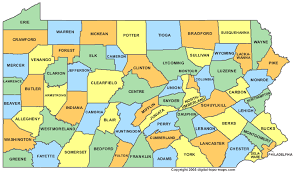.

Pennsylvania |
|
Pennsylvania
Revisions in law target child abuse
by Anjani Amladi
Every 10 seconds a report of child abuse is made in the United States — more than 3 million reports involving greater than 6 million children per year. More than five children die every day as a result of child abuse, most under the age of 4. About half of child fatalities caused by abuse or mistreatment are not reported on death certificates. |
Though it may be easy to convince ourselves that child abuse or mistreatment does not happen in our own backyards, the sad fact is that it happens everywhere. Child abuse occurs at every socioeconomic level and educational level, across ethnic and cultural lines, and, yes, in small, quiet cities and towns in Northeast Pennsylvania. In fact, the Children's Advocacy Center, Lackawanna County's designated child abuse center, provided services to 1,448 children and adolescents in 2014. Of these, 80 percent experienced sexual abuse, 16 percent experienced physical abuse, and the rest experienced a combination of both physical and sexual abuse and/or severe neglect.
The state's Child Protective Services Law has undergone many changes, which went into effect on Jan. 1. Perhaps the most important are lowering the threshold of what constitutes child abuse, expanding the list of people defined as a mandatory reporters, clarifying the mandatory child abuse reporting process and providing increased education to people who are defined by law as mandatory reporters.
Defining child abuse
Pennsylvania law (Title 23, Chapter 63) defines child abuse as intentionally, knowingly or recklessly doing any of the following through any act or failure to act:
(1) Causing bodily injury to a child.
(2) Fabricating, feigning or intentionally exaggerating or inducing a medical symptom or disease that results in a potentially harmful medical evaluation or treatment.
(3) Causing or substantially contributing to serious mental injury.
(4) Causing sexual abuse or exploitation of a child.
(5) Creating a reasonable likelihood of bodily injury.
(6) Creating a likelihood of sexual abuse or exploitation.
(7) Causing serious physical neglect.
(8) Causing the death of a child.
(9) Engaging in:
Kicking, biting, throwing, burning, stabbing or cutting a child in a manner that endangers the child.
Unreasonably restraining or confining a child, based on consideration of the method, location or the duration of the restraint.
Forcefully shaking, slapping or otherwise striking a child under age 1.
Interfering with a child's breathing.
Causing a child to be present anywhere a methamphetamine laboratory is being operated.
Leaving a child unsupervised with a person, other than the child's parent, who is required to register as a sexual offender where the victim was under 18, has been determined to be a sexually violent predator, or has been determined to be a sexually violent delinquent child.
Mandatory reporting
For years, the designation of a mandatory reporter and the process for making a report have been cloudy, to say the least. The new law defines a mandatory reporter as anyone who is:
Certified or licensed to practice in any health-related field.
A medical examiner, coroner or funeral director.
An employee of a health care facility or medical provider that is responsible for the care or treatment of individuals.
A school employee.
An employee of a child care service who has direct contact with children.
A clergyman, priest, rabbi, minister, Christian science practitioner, religious healer or spiritual leader of any established church or religious organization.
A paid or unpaid person who accepts responsibility for a child (for example, youth coaches and troop leaders.)
An employee of a social service agency with direct contact with children.
A peace officer or law enforcement officer.
An emergency medical services provider.
An employee of a public library with regular contact with children.
An independent contractor.
A mandated reporter is required to make a report if there is reasonable cause to suspect that a child may be being abused. An oral or written report must be completed and submitted within 48 hours to the state.
Increased education
Act 31, an amendment to the Child Protective Services Law, requires that further training be provided for mandatory reporters. Anyone with direct contact with children, or an executive/facility director who provides services for care of children, who is applying for a license or certification must complete at least three hours of approved training regarding child abuse. This includes foster parents.
Also, anyone who is renewing a license or certification must complete at least two hours of continuing education per license cycle. At a minimum, the training must cover recognition of signs of child abuse, as well as reporting requirements for suspected or witnessed child abuse.
PAUL J. MACKAREY, P.T., D.H.Sc., O.C.S., is a doctor in health sciences specializing in orthopedic and sports physical therapy. He is in private practice and an associate professor of clinical medicine at the Commonwealth Medical College. His column appears every Monday. Email: drpmackarey@msn.com.
ANJANI AMLADI, a fourth-year medical student at the Commonwealth Medical College in Scranton, is the guest author for today's column. She was raised in San Ramon, California, and earned a Bachelor of Science in biological sciences at the University of California at Davis. She plans to become a psychiatry resident and specialize in child/adolescent psychiatry. She is the recipient of the 2014/15 TCMC Healthcare Journalism Award presented by Dr. Paul Mackarey.
NEXT WEEK: Preventing, identifying and reporting child abuse.
KAREN ARSCOTT, D.O., associate clinical professor in clinical sciences at the Commonwealth Medical College, was medical reviewer for this column.
Where to report potential child abuse:
ChildLine: www.compass.state.pa.us/cwis 800-932-0313
Children's Advocacy Center: 1710 Mulberry St., Scranton, PA 18510 - 570-969-7313 www.cacnepa.org
National Child Abuse Hotline: www.childhelp.org 800-4-A-CHILD
Other Resources: www.childwelfare.gov - http://keepkidssafe.pa.gov
|